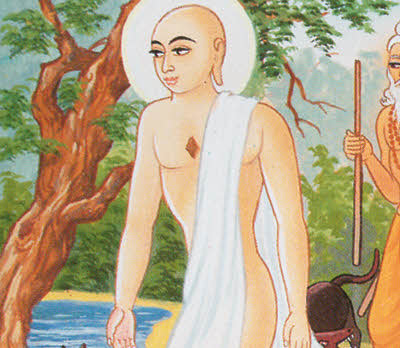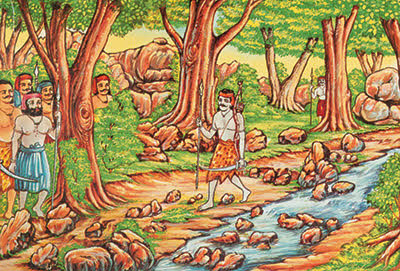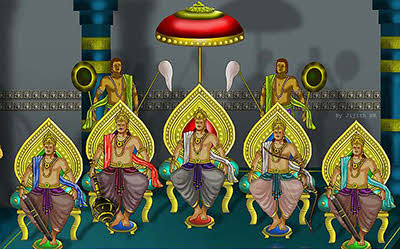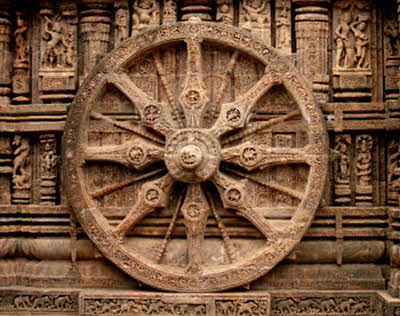
In the meantime attended by the gods living in the twenty eight lacs of palaces, aroused by the sound of the bell Mahaghosa, the Lord of the Aisanakalpa, carrying a trident, having a bull as a vehicle, seated in a car Puspaka made by the Abhiyogya Puspaka, descended on the south of Aisanakalpa by an oblique path to Mt. Ratikara in the northeast of Nandisvara and, having contracted his car like the Indra of Saudharma, quickly went before the Blessed One on Mt. Meru with devotion. Sanatkumara, surrounded by gods living in the twelve lacs of palaces, came in the car Sumanas. Continue reading “The Gods – Their Cars – Their Bells their Family – Part 1” »
The Gods – Their Cars – Their Bells their Family – Part 1
The Lord’s life as a Chadmastha

Followed by kings, Kaccha, Mahakaccha and others, who had taken the vow of mendicancy after him, the Lord began to wander over the earth in silence. The Lord did not obtain alms anywhere even on the day for breaking his fast; for the people at that time were thoroughly simple and were not familiar with alms-giving. Some people brought the Master, who had come for alms, horses surpassing in speed Uccaihsravas (Indra’s horse); others brought choice elephants whose strength was superior to that of the elephants of the quarters; some brought maidens excelling the Apsarases in loveliness; others ornaments that had the brilliance of lightning; others garments of various colors like twilight clouds; still others garlands and wreaths rivaling wreaths of the coral-tree; some brought a heap of gold resembling Meru’s peak; others a pile of jewels like the peak of Mt. Rohana; for they knew the Lord only as a king as before. Continue reading “The Lord’s life as a Chadmastha” »
Lord Rishabhdev’s Initiation

The Master then summoned his vassals, etc., from all quarters; and Bharata and his other sons, Bahubali, etc. The Lord addressed Bharata, “Son, take our kingdom. Now I intend to assume the sovereignty of self-restraint.” At this speech of the Master, Bharata stood for a moment with his face downcast; then bowed, his hands folded together, and spoke in a choked voice: “Even as there is happiness for me in falling before the foot-stool of your lotus-feet, so there is none for me seated on the jeweled lion-throne, O Master. Even as there is happiness for me running on foot before you, O Lord, so there is none for me mounted on the shoulder of a pleasure elephant. Continue reading “Lord Rishabhdev’s Initiation” »
Founding of Vidyadhara Cities

Now, the sons of Kaccha and Mahakaccha, Nami and Vinami by name, men of good training, had gone previously to distant foreign countries at the Master’s command. Returning by the road through this forest, they saw their fathers, and reflected: “Why have our fathers come to such a state, as if they were without a lord, when Vrsabhanatha is their lord? Then they had garments of Chinese silk; now garments of bark suitable for Kiratas. Then there was ointment on their bodies; now dust suitable for animals. Then their hair was coiled with wreaths; now it is matted like a fig-tree. Then they rode on elephants; now they go on foot like foot-men.” Continue reading “Founding of Vidyadhara Cities” »
Eleventh Incarnation as Vajranabha – Part 1

In the continent Jambudvipa, in the East Videhas, in the province Puskalavati in the vicinity of the Ocean, in the city Pundarikini, they were born in succession as the five sons of King Vajrasena by his wife Dharini. Among them the soul of the doctor was the first son, named Vajranabha, indicated by fourteen great dreams. The soul of the prince was the second, named Bahu. The minister’s son was named Subahu. The Souls of the sons of the merchant and trader were named Pitha and Mahapitha; and the soul of Kesava became a Rajput, Suyasas. Suyasas was devoted to Vajranabha even from childhood. Continue reading “Eleventh Incarnation as Vajranabha – Part 1” »
Division of time and description of the Golden Age

Then Sagara and Priyadarsana were born in the form of twins in the southern part of Bharataksetra in Jambudvipa, in the middle part of the space between the Gangas and Sindhu, in the third period in avasarpini, when there was the eighth part of a palya remaining. In the five Bharata- and Airavata-zones the twelve-spoked wheel of time is the basis of the law of time. Time is two-fold from the division into avasarpini and utsarprni. There are six spokes in avasarpini, beginning with Ekantasusama (Pure Bliss). Continue reading “Division of time and description of the Golden Age” »









